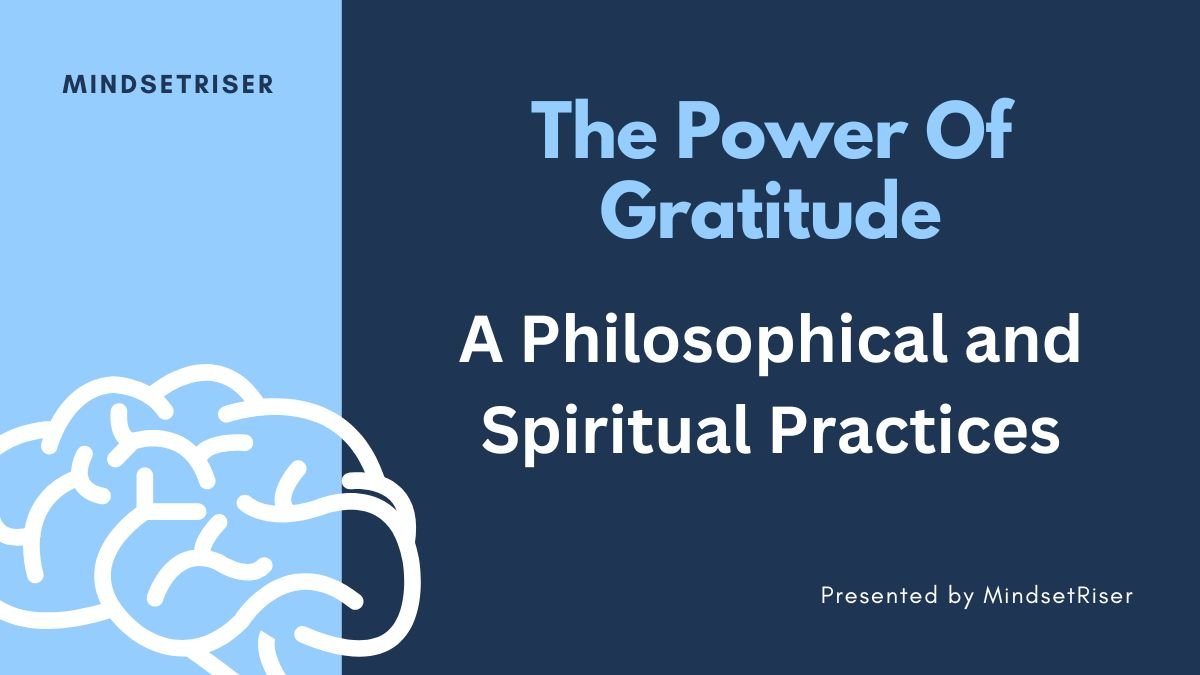The Power of Gratitude: A Philosophical and Spiritual Practice
Gratitude is one of the most transformative emotions and practices a person can embrace. Across various philosophical and spiritual traditions, gratitude is seen as a powerful force that not only improves our emotional well-being but also enriches our relationships and overall life satisfaction. In this article, we explore the power of gratitude from both philosophical and spiritual perspectives, examining how cultivating this practice can lead to a more fulfilling and meaningful life.
1. Understanding Gratitude: The Essence of Thankfulness
Gratitude is often defined as the recognition and appreciation of the good things in life, whether they are material, emotional, or spiritual. It is a practice of being thankful for what we have, rather than focusing on what we lack. Philosophers and spiritual teachers throughout history have emphasized the importance of gratitude as a means to cultivate happiness, contentment, and inner peace.
- Key Idea: Gratitude is not merely a response to external circumstances but a conscious choice to acknowledge the blessings in our lives. It involves shifting our focus from negativity or lack to the abundance and goodness present in each moment.
- Practical Application: One simple way to practice gratitude is by keeping a daily gratitude journal. Each day, take a moment to write down at least three things you are grateful for. This practice helps train the mind to focus on the positive aspects of life and increases overall well-being.
Reflection: Gratitude is a mindset that fosters positivity. By actively practicing gratitude, we develop a deeper sense of appreciation for the present moment and the people around us.
2. The Stoic View of Gratitude: Appreciating What You Have
The ancient Stoics, such as Epictetus and Marcus Aurelius, placed significant importance on gratitude as part of their philosophy of resilience and inner peace. For Stoics, gratitude is closely linked to the acceptance of life’s circumstances and the recognition that everything, both good and bad, is an opportunity for personal growth.
- Key Idea: Stoicism teaches that we should cultivate gratitude not just for the things we enjoy but also for the challenges we face. According to Marcus Aurelius, “The impediment to action advances action. What stands in the way becomes the way.” In this view, gratitude is not only about acknowledging the good but also appreciating life’s obstacles as part of our journey toward virtue.
- Practical Application: In the Stoic tradition, we can practice gratitude by reframing difficult situations. When faced with adversity, ask yourself what you can learn from the experience or how it can help you grow as a person. By viewing challenges through a lens of gratitude, we transform obstacles into opportunities.
Reflection: The Stoic perspective on gratitude teaches us to appreciate life in all its forms. By accepting both pleasure and pain, we cultivate resilience and inner peace.
3. Gratitude in Eastern Philosophy: A Path to Enlightenment
In Eastern philosophical traditions such as Buddhism and Taoism, gratitude is viewed as a vital element in spiritual practice. Both Buddhism and Taoism emphasize the interconnectedness of all life and the importance of cultivating gratitude for the present moment.
- Key Idea: In Buddhism, gratitude is seen as an essential component of mindfulness and a means to reduce suffering. Practicing gratitude helps individuals detach from material desires and focus on spiritual growth. The concept of “right understanding” in Buddhism encourages us to appreciate the impermanence of life and be grateful for every fleeting moment.
- Practical Application: In daily life, Buddhist practice encourages mindfulness techniques that can help us cultivate gratitude. This might include mindfulness meditation, where we focus on the present moment and express gratitude for the simple joys of life—breathing, nature, and human connection.
Reflection: By practicing gratitude in the Buddhist tradition, we acknowledge the impermanence of life and embrace the present moment. This brings peace, reduces attachment, and fosters a deeper connection with the world.
4. The Christian Perspective on Gratitude: A Spiritual Duty
In Christianity, gratitude is often described as a spiritual duty, an expression of reverence and love for God. Gratitude in the Christian tradition is not only an emotional response but also a moral imperative—an essential part of living a faithful life.
- Key Idea: Christians are taught to give thanks to God in all circumstances. The Bible states, “Give thanks in all circumstances; for this is God’s will for you in Christ Jesus” (1 Thessalonians 5:18). Gratitude in Christianity involves acknowledging the blessings bestowed upon us and recognizing that all good things come from God.
- Practical Application: In Christian practice, gratitude is often expressed through prayer, worship, and acts of kindness toward others. A regular practice of prayerful thanksgiving can help strengthen the relationship with God and foster a spirit of humility and service toward others.
Reflection: Gratitude in Christianity is a transformative spiritual practice. By giving thanks in both good and challenging times, Christians cultivate a deeper sense of faith and trust in divine providence.
5. Gratitude in Positive Psychology: A Science-Based Approach
In the field of positive psychology, gratitude is studied as a powerful tool for enhancing mental health and well-being. Researchers like Robert Emmons and Martin Seligman have found that cultivating gratitude can lead to increased happiness, better relationships, and improved physical health.
- Key Idea: Positive psychology defines gratitude as a long-lasting positive emotional response that fosters well-being. Regularly practicing gratitude has been shown to reduce depression, enhance social bonds, and promote a more optimistic outlook on life.
- Practical Application: In positive psychology, gratitude exercises such as keeping a gratitude journal, writing gratitude letters, or practicing the “three good things” exercise can help individuals focus on positive experiences and enhance overall life satisfaction.
Reflection: Scientific research confirms that gratitude has tangible benefits for mental and physical health. By regularly practicing gratitude, we can experience greater happiness and fulfillment in life.
6. The Transformative Power of Gratitude: A Practice for All
Gratitude is a universal practice that transcends philosophical and spiritual traditions. Whether through Stoicism, Buddhism, Christianity, or positive psychology, the act of cultivating gratitude has profound transformative power. By making gratitude a regular part of your life, you can shift your perspective, increase your resilience, and deepen your connection to others.
- Key Idea: The power of gratitude lies in its ability to change our focus from what is lacking to what is abundant. It allows us to experience joy in the present moment and to appreciate the richness of life, even amid struggles.
- Practical Application: One way to harness the transformative power of gratitude is by incorporating it into your daily routine. Start or end each day by reflecting on the things you are grateful for, whether they are big or small. Over time, this practice helps reshape your mindset and promotes lasting well-being.
Reflection: Gratitude is a practice that offers immediate and long-term benefits. By regularly practicing gratitude, we can cultivate a positive, contented, and peaceful life.
Conclusion: The Enduring Power of Gratitude
Gratitude is more than just an emotion; it is a powerful practice that transcends time, culture, and philosophy. Whether viewed through the lens of Stoicism, Eastern philosophy, Christianity, or modern positive psychology, the transformative power of gratitude is undeniable. By embracing gratitude as a daily practice, we can foster deeper relationships, enhance our emotional well-being, and cultivate inner peace.
Incorporating gratitude into our lives allows us to connect with the present moment and experience life with greater appreciation and joy. The practice of gratitude offers a simple yet profound way to enrich our lives, create positive change, and experience a more fulfilling existence.

